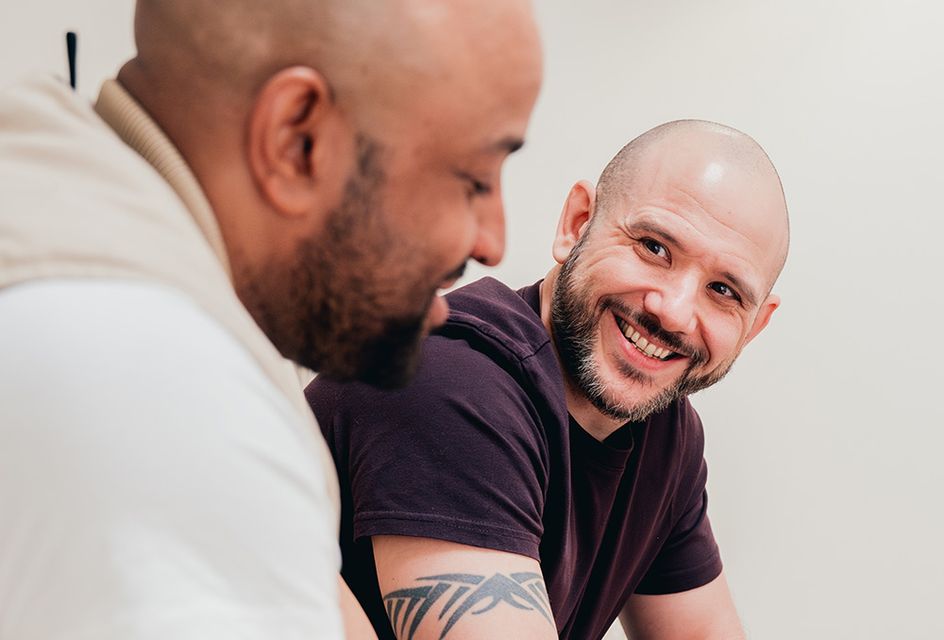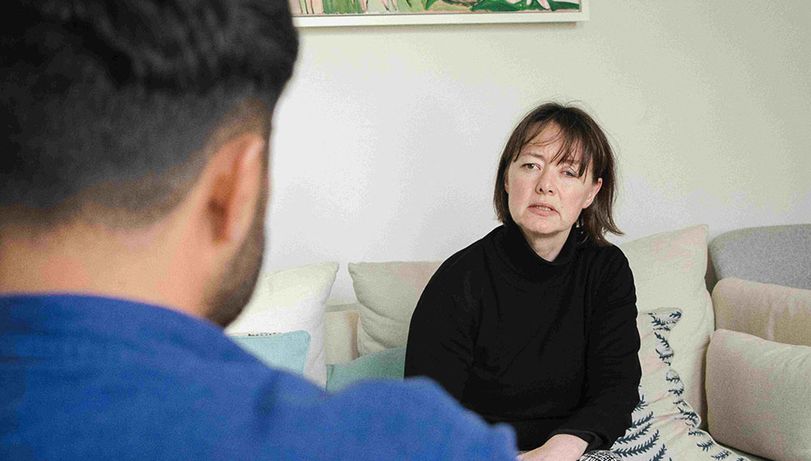How James’ Place is preventing suicide in men through free therapy
Author: Ellen O’Donoghue 13 May 2025 1 min read
James' Place works to save the lives of men in suicidal crisis by offering free, life-saving therapy.

This article contains mentions of suicide. Please read with care.
I have been Chief Executive at suicide prevention charity James’ Place since 2019.
James’ Place was founded by Clare Milford Haven and Nick Wentworth-Stanley following the tragic death of their son James. Aged just 21, James took his own life ten days after a minor operation. He sought help for his anxiety and suicidal thoughts but didn’t find the urgent help he so desperately needed. Clare and Nick were determined to prevent other families from losing the men they love and set up James’ Place to help men in suicidal crisis.
What is James’ Place?
At James’ Place we work to save the lives of men in suicidal crisis. We are a charity offering free, life-saving therapy to suicidal men in London, the North East and the North West. Our treatment is proven to work, quick to access and delivered in a safe, friendly, non-clinical environment by trained, professional therapists.
As a charity we have now provided free, life-saving therapy to over 3,100 suicidal men at dedicated suicide prevention centres in Liverpool, London and Newcastle.
Following the success of our first three centres, we plan to open our fourth centre in Birmingham early next year and aim to have five centres open by the end of 2026. Our work is needed as men are three times more likely to die by suicide than women. The men we see at James’ Place usually do not have long term mental health issues but are suicidal in response to life events such as bereavement, relationship breakdown and financial problems.
We were proud to win two awards at the RSPH Health & Wellbeing Awards in 2024 - the Mental Health and Wellbeing Award and the Public Health Minister’s Award for our innovation, strong academic feel, focus on prevention and inclusion, regional spread and potential for scale.
Why James’ Place provide support for men
We treat men primarily because men consistently account for over 75% of suicides, and over 4,000 men die by suicide every year. Rates are particularly high for men in areas with higher levels of socio-economic deprivation; for example, the rates of suicide in the North East and the North West of England, where we have centres, are the highest in England.
Why are rates of suicide higher in men?
A number of factors contribute to the higher rates of male suicide. One is that men tend to use more lethal means, which means that the way they attempt suicide is more likely to result in their death. Another is that men can find it difficult to seek help, and often only reach out when they get to a crisis point.
In general men are less likely to access psychological therapies: only 36% of referrals to NHS talking therapies are for men, so we felt strongly that a dedicated, specialist service for men would be most successful at saving lives.
The men we see have reached the point of crisis largely due to psychosocial issues, such as financial problems, relationship breakdown, or difficulties at work or with education. We make getting help as easy and as quick as possible, and commit to seeing men quickly, without a waiting list.
These men are often not in contact with, or receiving help from, traditional mental health services – they do not need medical intervention but structured, therapeutic treatment to overcome their suicidal crisis. We help them quickly, and enable them to find hope for the future.
How therapy sessions at James’ Place work
Our treatment takes place at our safe, friendly, non-clinical centres, usually through six to eight face-to-face sessions with one of our trained professional therapists over around a month. We see men quickly with no waiting list, within two working days. Our professional therapists get quickly to the heart of a man’s suicidal crisis and help him solve it.
Our therapy is collaborative, practical and action-oriented. It gives the men we see structure and a pathway out of suicidal crisis, and includes safety planning. During the therapy sessions a set of cards are used that are unique to James’ Place which help the men we see quickly articulate how they are feeling and what is causing their crisis.
What happens after treatment?
After men have finished their treatment, we can offer mentor or peer support if needed. We have a team of fantastic volunteer mentors in London and Liverpool who offer support and encouragement to men who have used our service after their intervention has ended. We also run a peer support group every two weeks for men who have completed the James’ Place intervention. We also signpost men to longer-term support they may require via other services in the NHS or elsewhere.
What impact have James’ Place had?
Our treatment is independently evaluated by Liverpool John Moores University and shows that men who come to James’ Place experience a clinically and statistically significant positive change in their mental wellbeing following their treatment, and reduced levels of psychological distress.
Our model has shown to be transferable from our first centre in Liverpool to two additional centres and we have now helped over 3,100 men find hope for the future. Without James’ Place these men would have struggled to find quick access to help elsewhere.
My experience at James’ Place was really exceptional. My therapist was fantastic, she immediately put me at ease and I was able to open up and express my feelings for the first time. I think I was in tears for the first three sessions. Having someone there who was qualified to deal with my situation made me feel very comfortable and safe.
Ken, who recently used our Newcastle centre
Over seven sessions of therapy, I really changed. I stopped drinking, my mind became sharper and less foggy, I felt better in myself. I’m just on a different path now where I am more positive about the future and getting myself ready to go back to work. I’m trying to help other people going through a difficult time with what I’ve learnt. It’s been such an education that sharing your feelings and opening up is so worthwhile and does really help.
I just want to let everyone know to embrace any help that’s offered to you, things are never as bad as you think, you just need to learn to stop beating yourself up. James’ Place helped to open my eyes that my life was worth fighting for.
What’s next for James’ Place?
Our aim at James’ Place is to reach as many men as possible with our life-saving services. We aim to replicate our model in new centres in other cities in the UK, with Birmingham our next centre to open.
As a charity we rely on donations to be able to deliver our work, and although we have received two one-off grants from the Department of Health in the past, we do not receive statutory funding. Our challenge as a small and relatively new charity is to raise funds so that we can open more centres, and additionally to reach the men that need us.
James’ Place was specifically designed to help men in suicidal crisis and reduce male suicides. Our service is available to men in suicidal crisis in London, the North East and the North West. Men can refer themselves on our website jamesplace.org.uk. We also accept referrals from professionals including those working in health and community services, and from concerned friends or family members.
Working with James’ Place
We would like to work more closely with those working in public health in the regions where we operate, so they can help spread the word about the free service we offer. It’s so important to let men know that help is available if they are in crisis.
Please do get in touch if you would like to find out more about us by emailing [email protected]. You can also follow us or social media or sign up to our newsletter here to keep updated with our work.



